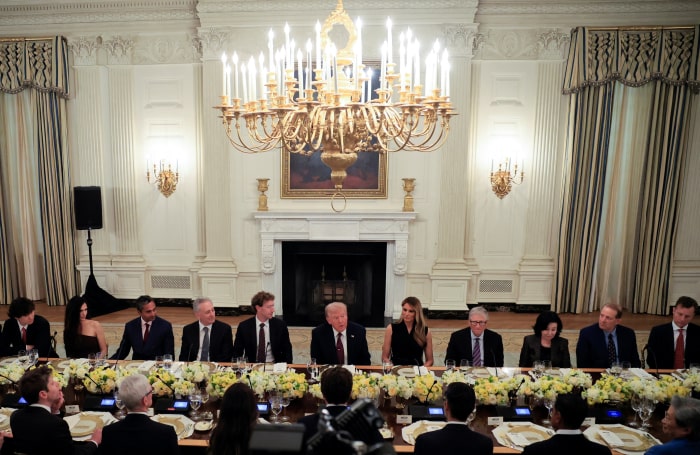How Trump’s Dinner with Tech Executives Could Spark $1 Trillion U.S. Investment and Clean Energy

Trump Hosts Key Tech Executives to Drive U.S. Investment and Energy Initiatives
Last Thursday evening, a select group of executives from leading technology companies convened for a private dinner with the U.S. President at the White House. The discussion focused on encouraging substantial capital investment within the country, aligned with securing dependable, affordable energy sources necessary to support burgeoning data infrastructure demands.
The gathering brought together influential figures from some of the most prominent tech firms, including CEOs of major industry players known for their pivotal roles in shaping technology worldwide. The central theme emphasized enhancing America's foothold in advanced technology development through commitments that link sizeable funding to stable energy supply chains.
Crucial to these talks was the emphasis on accelerating the regulatory processes governing the approval of energy projects essential for powering sophisticated computational systems. These systems include those running artificial intelligence platforms and large-scale data processing centers, whose electricity demands continue to expand rapidly.
Massive Domestic Investment Plans Announced
One of the keynote moments of the evening was when the representative of a major social media and virtual environment company revealed plans to inject over half a trillion dollars in investments across the United States by 2028. This pledge signifies one of the largest financial commitments from a single private sector entity toward domestic growth and infrastructure expansion.
Similarly, executives from a multinational technology corporation recognized for its consumer electronics and data solutions affirmed intentions to raise their national investment footprint to a comparable valuation. Part of this extensive plan includes a landmark data-center development valued at $50 billion, located in the southeastern region of the country.
Such announcements underscore a strategic alignment between corporate plans and national economic objectives, aiming to fortify technological innovation hubs through increased funding and infrastructural growth. These moves also reflect confidence in the country’s capacity to support cutting-edge facilities powered by sustainable and economical energy sources.
Policies to Strengthen Innovation and Energy Infrastructure
To sustain leadership in technological advancement, the administration introduced a policy framework designed to alleviate tax pressures on technology enterprises. This initiative seeks to incentivize reinvestment and deter companies from shifting operations or resources overseas by imposing tariffs unless substantial capital remains devoted to domestic growth.
The government-enterprise collaboration initiatives currently being finalized will prioritize expanding clean energy solutions and streamlining permit issuance for facility construction and upgrades. These aims are directly tied to the nation's broader goals of increasing renewable energy capacity while fostering economic resilience through job creation in high-skilled sectors.
These strategic partnerships are expected to culminate in legislative proposals slated for introduction before the end of the summer. Follow-up meetings have been scheduled to meticulously outline timelines for investments, alongside formulating contracts addressing energy procurement to meet the rigorous demands of tomorrow’s technology landscape.
Implications for the Future of Tech and Energy
This convergence of public-private efforts marks a pivotal moment in aligning economic policy with technological progress. By combining the capital strengths of industry leaders with targeted government support, the framework aims to position the United States at the forefront of artificial intelligence and data-driven innovation.
Moreover, the focus on harnessing renewable energy to support these expansions highlights a forward-looking approach considering environmental sustainability while meeting increasing power needs. The anticipated creation of thousands of skilled jobs also reflects a commitment to developing a workforce prepared for the complexities of modern tech enterprises.
Overall, this coordinated dialogue and subsequent agreements illustrate an ambitious roadmap to stimulate domestic investment in technology sectors vital to global competitiveness, backed by a robust, reliable, and modernized energy infrastructure.
